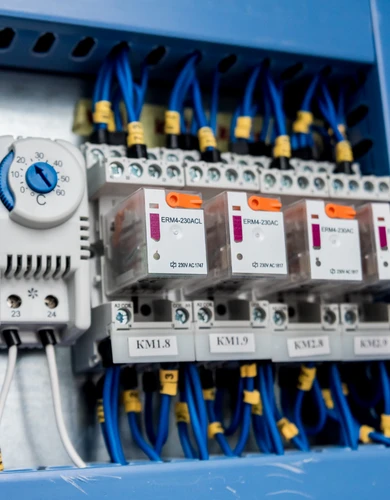Energy suppliers going bust
Energy suppliers going out of business is a natural consequence of Britain’s competitive, deregulated energy market.
Whenever a supplier ceases trading, Ofgem carefully manages the process to ensure that there is no interruption to power or gas supplies. However, there can be serious consequences for business customers, including the cancellation of fixed energy tariffs and the loss of credit balances.
In this guide, we advise businesses facing the unfortunate scenario of their energy supplier going bust. Here’s what we cover:
- Why do energy suppliers go bust?
- What happens when an energy supplier goes bust?
- What to do if your energy supplier goes bust
- How the Supplier of Last Resort (SoLR) works
- How to protect your business from supplier failures
Why do energy suppliers go bust?
The most common reason business energy suppliers go bust is unanticipated rises in energy prices.
To fulfil customer contracts, energy suppliers purchase electricity and gas on the wholesale market. If wholesale prices rise unexpectedly, suppliers can be caught in a financial trap where fixed contracts become highly unprofitable.
The 2021–22 energy crisis is a prime example. Over 30 energy suppliers collapsed, affecting thousands of businesses.
The cause was an unprecedented surge in wholesale electricity and gas prices, leaving suppliers unable to fulfil the fixed contracts their customers had signed up to.
The best business energy suppliers have strong financial reserves and hedge their price risk to minimise their exposure to fluctuations in energy prices.
What happens when an energy supplier goes bust?
In this section, we outline what happens to your business’s electricity and gas supplies when your energy supplier goes bust.
Transfer to the Supplier of Last Resort
Ofgem manages the Supplier of Last Resort (SoLR) process, ensuring no disruption to power or gas supplies by automatically switching your supply contracts to a new supplier.
The process of Ofgem finding you a new business energy supplier takes a maximum of 14 days and will end with your new supplier contacting you with details of your new deemed tariff.
Find out more below about how the Supplier of Last Resort process works.
Cancellation of existing contracts
When a business energy supplier goes bankrupt, all business energy contracts you have with the supplier will no longer apply and will not be transferred to your new supplier.
This means that any arrangements you have to fix unit business gas or business electricity prices per kWh will no longer protect your business from price volatility.
Ofgem negotiated deemed contract
Once Ofgem has arranged for you to switch business energy to the Supplier of Last Resort, your electricity and gas will be supplied under a special deemed energy contract.
Here’s a summary of typical deemed contract terms:
- Unit rates: Variable unit rates as negotiated by Ofgem.
- Standing charges: Business electricity standing charges and business gas standing charges that reflect underlying current distribution and metering costs.
- Term: Rolling; you can change tariff or switch to another supplier anytime.
- Exit fees: No fees to terminate the contract.
Unresolved complaints
Complaints against business energy suppliers are typically not transferred to the Supplier of Last Resort.
We recommend contacting your new supplier’s customer service team if your complaint remains unresolved. Read our full guide to business energy supplier complaints for more information.
Account balances and unpaid bills
If you have unpaid bills or outstanding account balances with your current business energy supplier, these will either:
- Be transferred to the Supplier of Last Resort or
- Be collected as part of the insolvency proceedings of your existing supplier.
The initial communications from your new supplier will clarify which of these apply. Any amounts owed to your current supplier will remain payable in either scenario.
Credit owed from your supplier
Unlike domestic customers, Ofgem does not protect the credit balances of business customers in the event of a supplier going bust.
In most cases, you will need to contact the administrator of your supplier to attempt to recover any credit balances.
If you believe there is a risk of your supplier going bankrupt, we recommend delaying bill payments to move your account into a debit position.
What to do if your energy supplier goes bust
Ofgem guarantees that there will be no interruption to your power or gas supplies if your business energy supplier goes bust.
Despite this, our experts recommend taking the following actions during the process.
Take manual meter readings
We recommend taking regular manual meter readings while your supplier is going bust and photographing each meter.
This applies even to half-hourly meters, smart meters, and advanced business gas meters, which usually transmit automatic readings.
Refer to our manual meter readings guide for a step-by-step guide to the process.
Review your account balance
Following your final meter reading, if your account is in credit (meaning you have overpaid and your supplier owes you money), recovering this balance may be difficult.
When notified of a problem with your supplier’s solvency, we recommend cancelling your direct debit to stop automatic payments.
Only make manual payments once your meter readings have been incorporated into the final bills from your supplier.
Save bills and other documents
When you are informed that your business energy supplier is going bust, we recommend downloading and digitally storing all business electricity bills and business gas bills from your supplier’s online portal.
If a supplier runs out of money, their website may abruptly stop working due to unpaid hosting fees, making these documents unretrievable.
Await your new supplier appointment
Ofgem recommends not attempting to switch suppliers while your current supplier is going bust.
Instead, wait for confirmation of the transfer to your new supplier.
If you attempt to switch too early, the request will likely be blocked using the business energy objections process.
Compare the market and switch
Once you’ve been notified that the transfer to the Supplier of Last Resort is complete, we recommend searching for a more favourable tariff.
Use our business electricity comparison or business gas comparison service to compare the latest tariffs from our panel of trusted energy suppliers.
How the Supplier of Last Resort (SoLR) works
When a British energy supplier goes bust, Ofgem urgently appoints a new supplier through the Supplier of Last Resort (SoLR) process. This selection is crucial to ensure that affected customers (both homes and businesses) continue to receive gas and electricity without interruption.
What is the Supplier of Last Resort mechanism?
Here’s a step-by-step breakdown of the Supplier of Last Resort mechanism. The process typically takes less than two weeks to complete.
1. Revoking supplier licence
A supplier going bust is typically triggered by a Statutory Demand made by a bank or other creditor, validated by a court ruling that officially declares the supplier bankrupt. When this happens, Ofgem will revoke the supplier’s licence and announce this on their website.
2. Supplier selection process
Ofgem runs a selection process to appoint a new supplier to take over the failed company’s MPANs and MPRNs. This process is often completed within a few days.
See below for the criteria Ofgem uses to select the new supplier.
3. Transfer of customers
Once a new supplier is appointed, customers are automatically transferred to them.
The new supplier will contact their customers to inform them of the transfer and the new tariff terms.
Criteria for selecting a new supplier
If a commercial electricity or business gas supplier licence is revoked, Ofgem invites remaining suppliers to express interest in taking on the failed supplier’s customers.
When selecting the Supplier of Last Resort, Ofgem assesses:
- Financial resilience – Can the supplier handle a large influx of customers without collapsing?
- Operational capacity – Does the supplier have the systems, staff, and resources to onboard new customers smoothly?
- Customer service quality – How well does the supplier handle billing, queries, and complaints?
- Pricing and tariff structure – How competitive is the deemed contract being offered to business customers?
How to protect your business from supplier failures
Your business energy supplier going bust is more than an inconvenience. Any fixed energy contracts will be cancelled through the Supplier of Last Resort process. This can disrupt your business energy procurement strategy.
It is important to consider financial stability when choosing a new business energy supplier.
Less-established suppliers that have recently been granted a supply licence typically carry a higher risk of going bust.
At Business Energy Deals, we only partner with trusted UK-based suppliers. Visit our business energy comparison page to find out more.

